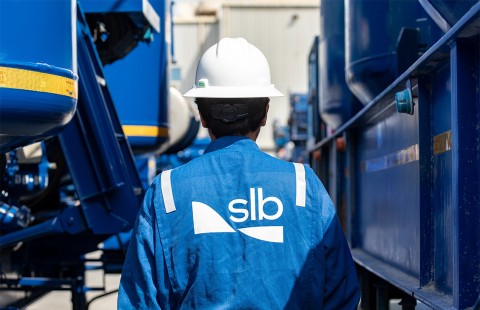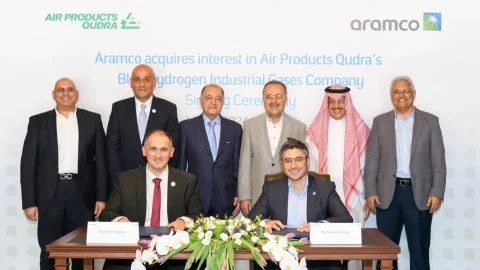As the world grapples with the urgent need to curb greenhouse gas emissions and combat climate change, the oil and gas industry is increasingly turning its focus toward environmentally sustainable practices. Drilling waste management, a crucial aspect of oil and gas operations, has traditionally been associated with high carbon emissions, elevated costs, and safety risks.
Some studies have shown that methane emissions from offshore oil and gas operations are even greater than those on land. In Fact, offshore drilling poses risks such as underwater life disruption, air and water pollution, noise pollution, and the potential for oil spills and leaks, all of which can have severe environmental consequences.
One of the pioneering solutions to these challenges was the TCC RotoMill® Drill Cuttings Treatment technology, which was introduced by Total Waste Management Alliance (TWMA).
This technology depends on thermal drill cuttings processing for separating drill cuttings and associated materials into three constituent parts, oil, water, and solids for recycling and reuse.
Traditional offshore drilling waste management involves skips, containers used to store and transport waste, loaded onto vessels and transported long distances to a centralized processing facility, generating significant volumes of CO2 in addition to increased risk safety and well cost.
“By one-side processing, we eliminate all the carbon producing steps from the offshore drilling operations and treat at the well site. So, there’s no more equipment and/or disposal facility. Utilizing the thermal drill cuttings processing technology, which separates drill cuttings from the associated materials and returns it to its original elements, solids, oil and water, the client or the operator gets a valuable recovery on the oil, especially that the low toxic oil-based mud can be very expensive,” Abdelrahman Amin, general manager for TWMA Egypt said during the 9th Convention organized by Egypt Oil&Gas Group in November 2023.
This technology uses a unique method of creating heat through friction which is converted into thermal energy, which in turn evaporates the liquids (oil and water) from the solids.
Through this, TWMA ensures recovered base fluid retains its full original quality and can be reused in the drilling mud system, returning significant commercial savings and ensuring environmental benefits to operations.
Herein, TCC RotoMill technology lowers carbon emissions by an average of 50%, reduces well cost, and HSE risk associated with shipping cuttings for offsite processing.
Case studies
TWMA utilized its RotoMill technology in the UAE in collaboration with ADNOC between four concessions, three of them being offshore, from offshore rigs, and the fourth one from offshore artificial island.
The agreement entailed the diversion of drill cuttings from the jack-up rigs to the artificial island, eliminating the conventional practice of transportation to source.
Normally, the waste from those 18 rigs gets transported to the central processing facility on location on the artificial island while, non-aqueous fluid cutting skips gets transported to onshore centralized facility. The average distance from shore to the rig is 137 kilometers, resulting in generating 30 tons of CO2 per round trip.
Through RotoMill technology, the process reduced 68% of carbon emissions, equivalent to 5,177 tons of CO2 in one year, and the recovery and reuse of 33,661 barrels of oil in the drilling process, worth of $5 million value base oil recovers. The process also saved 315,500 kilometers in transportation and less than 10,000 lifts.
“The process of green waste as a source of production is directly reused back on the active mud system, creating environmentally sustainable drilling operation, whilst delivering commercial value from the use of the carbon dioxide. Well site processing improves the safety performance. All the lifts have been eliminated, all the transport and all the hazards are eliminated. Removing the logistics associated with skip and ship or ship to shore, whether it be additional supply vessels, haulage trucks, handling equipment like forklifts, trains, etc., that’s a significant reduction in cost,” Abdelrahman Amin explained.
Similarly, a case study in the UK North Sea with Chrysaor North Sea Ltd where TWMA implemented TCC RotoMill offshore cuttings processing & disposal technology on the Valaris JU-249 jack-up rig for two developed wells.
TWMA installed 4 x CSTs (Cutting Storage and Transfer Tanks), a screw conveyor system and a TCC RotoMill with air transfer back up system on location between wells. The system allowed drill cuttings to be treated at source, eliminating the requirement for crane and vessel activity associated with skip and ship operations.
The project resulted in processing 3,149 tons of drilled cuttings from two wells, $444,000 Worth of base oil recovered and reused in the drilling mud system.
The project also eliminated more than 7,800 mechanical lifts and 4,700 miles of road transportation, simplified vessel logistics, and saved approximately £1.2 million pounds ($1.5 million) in drilling waste disposal cost.








